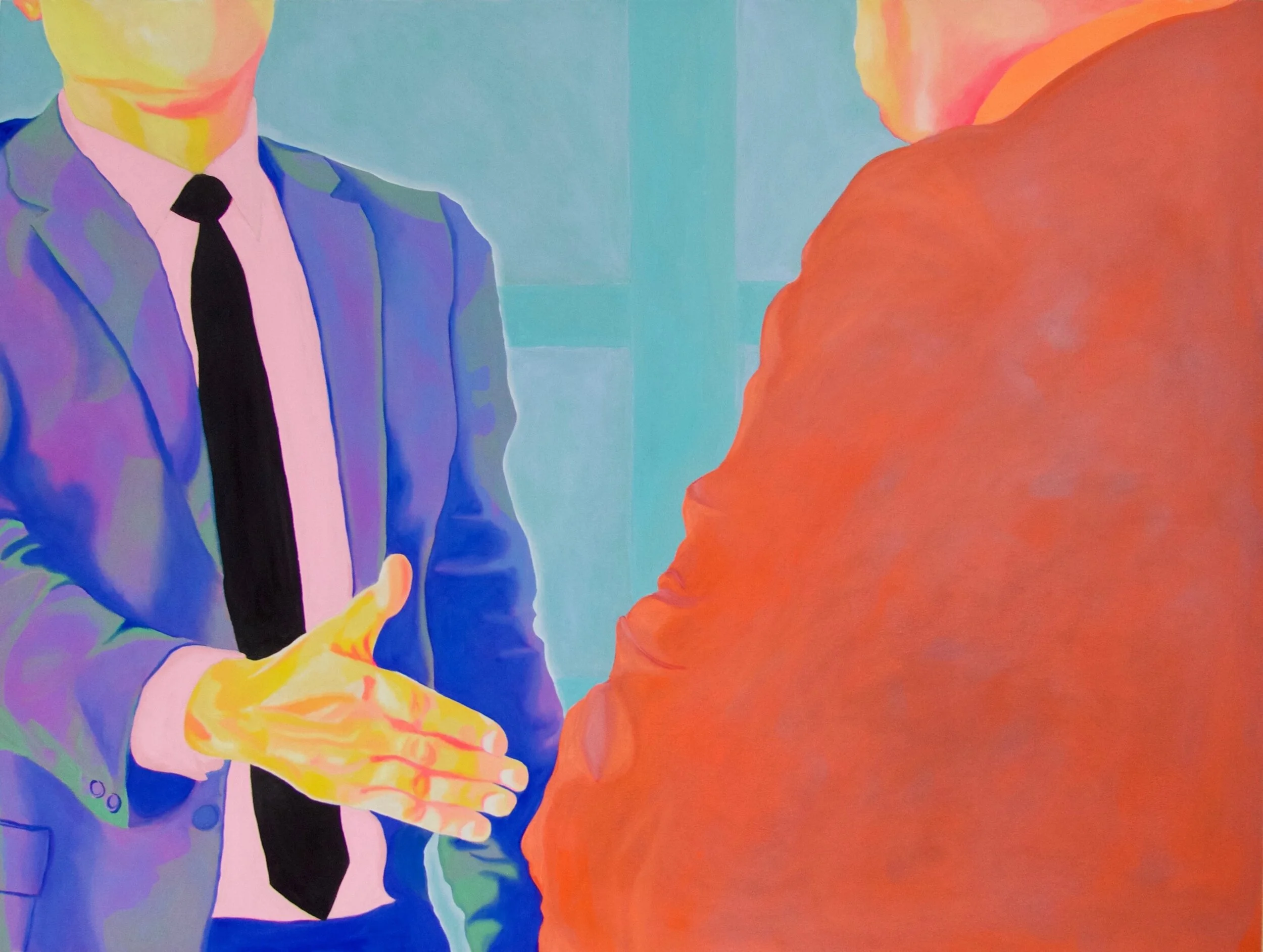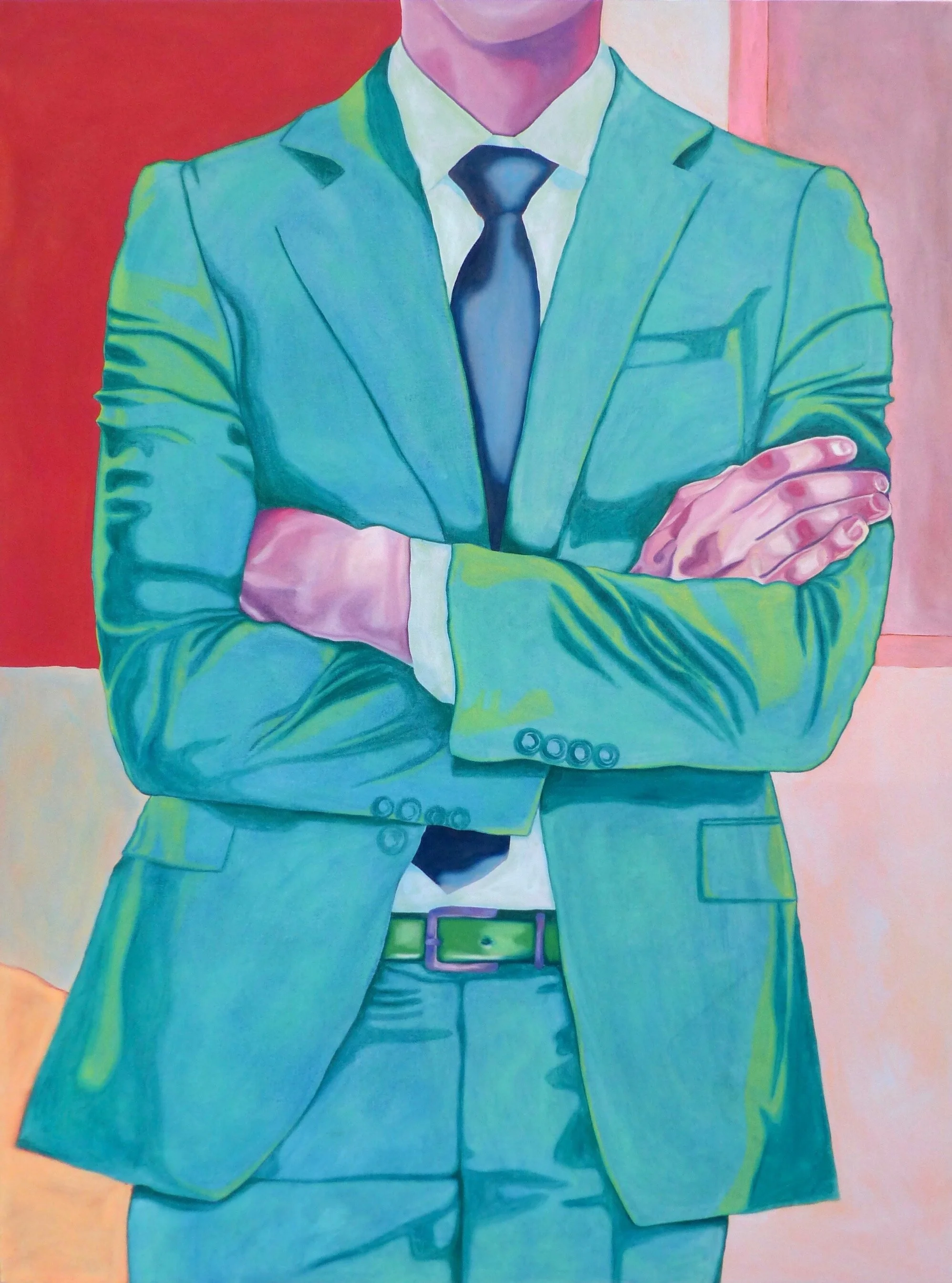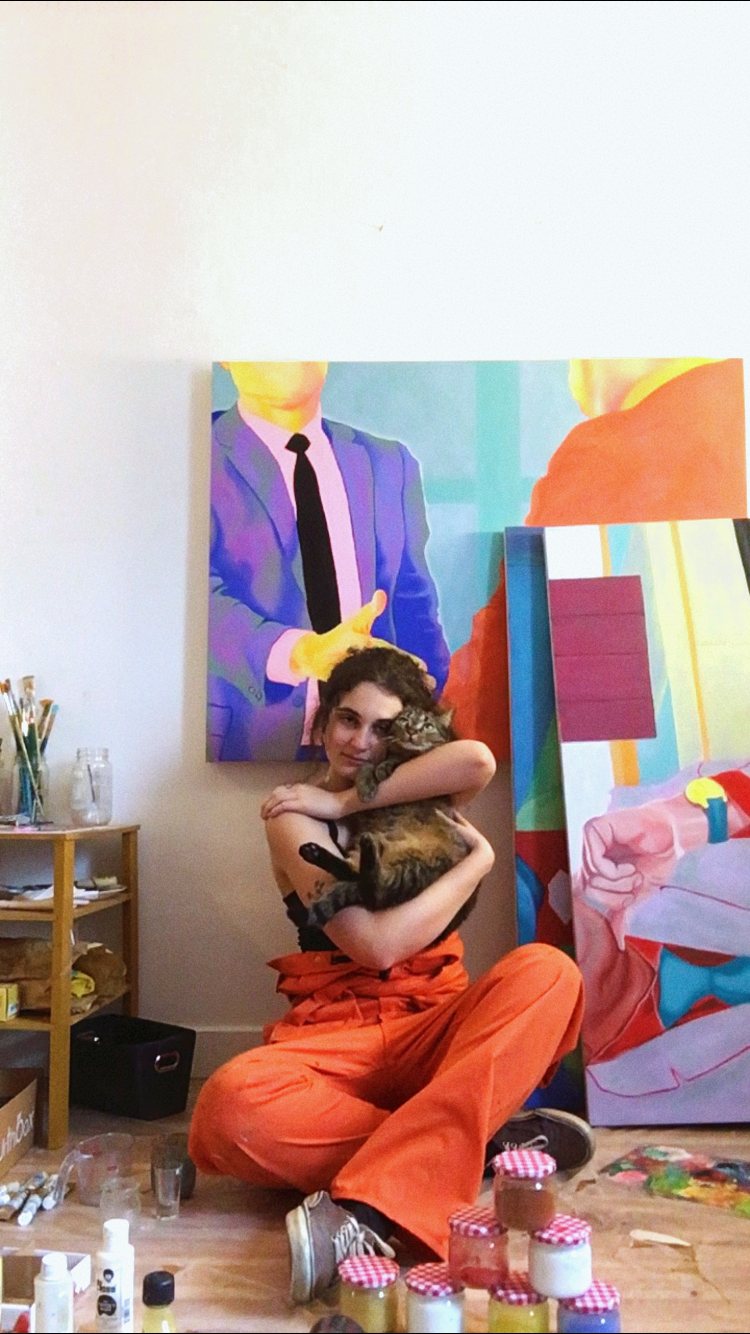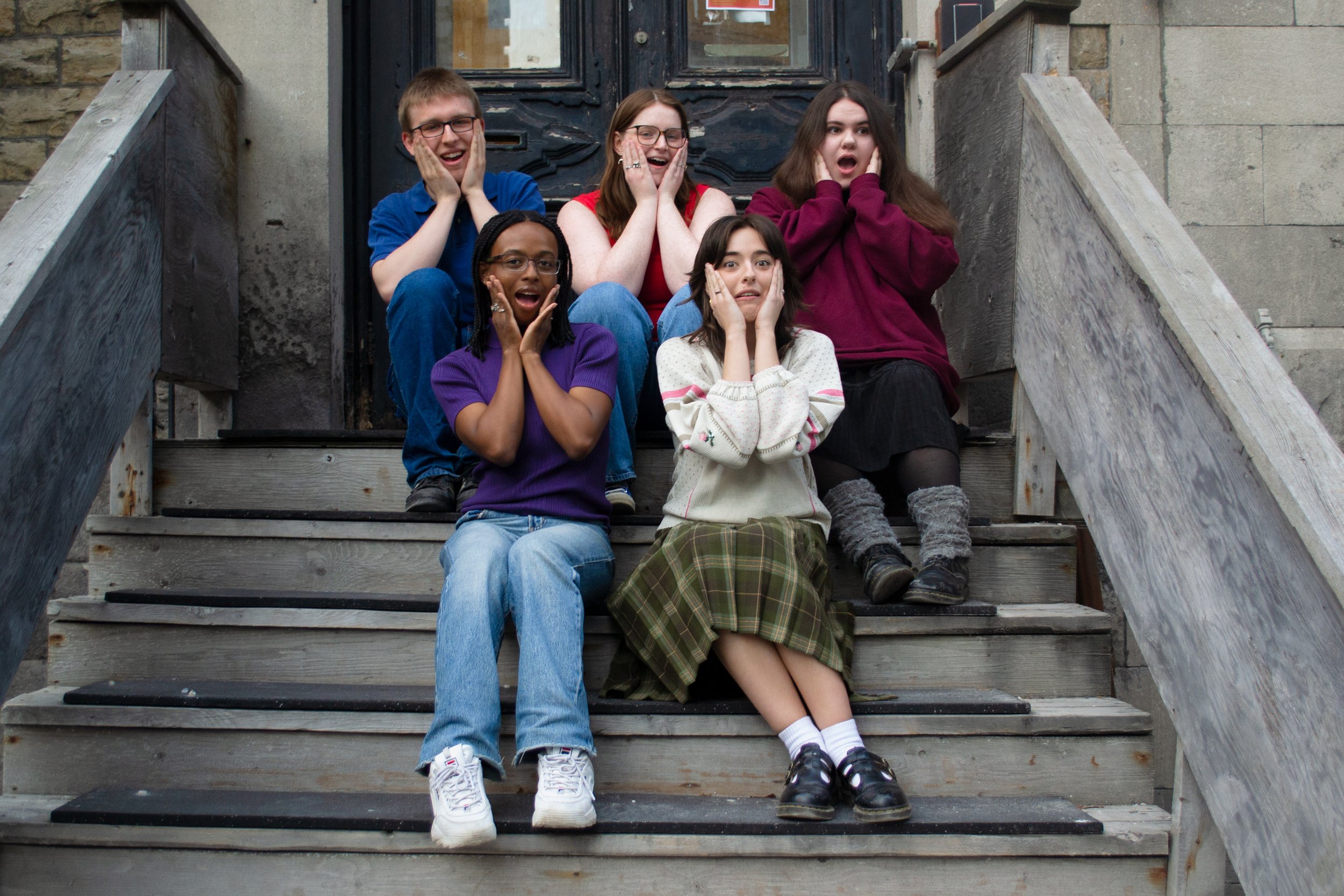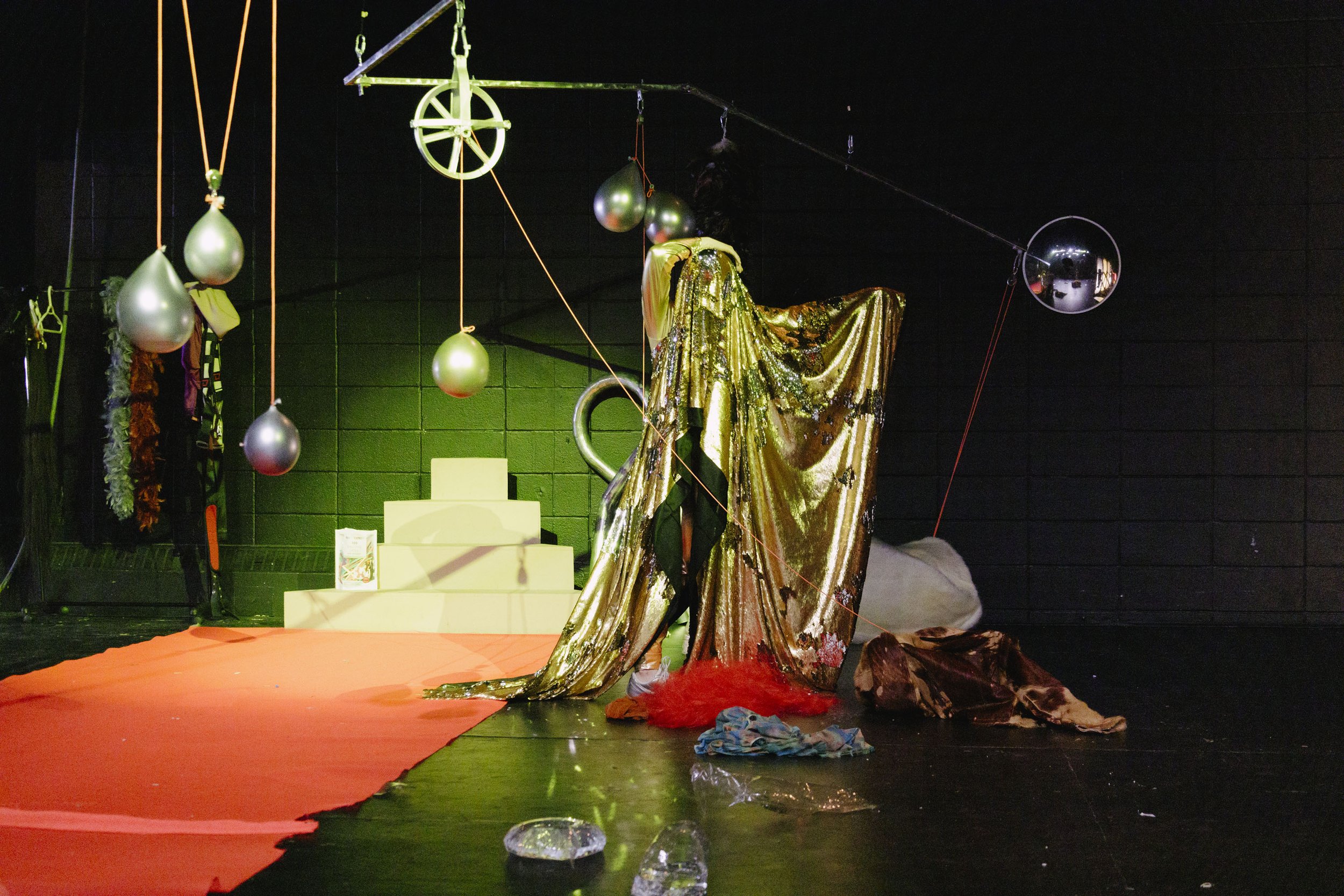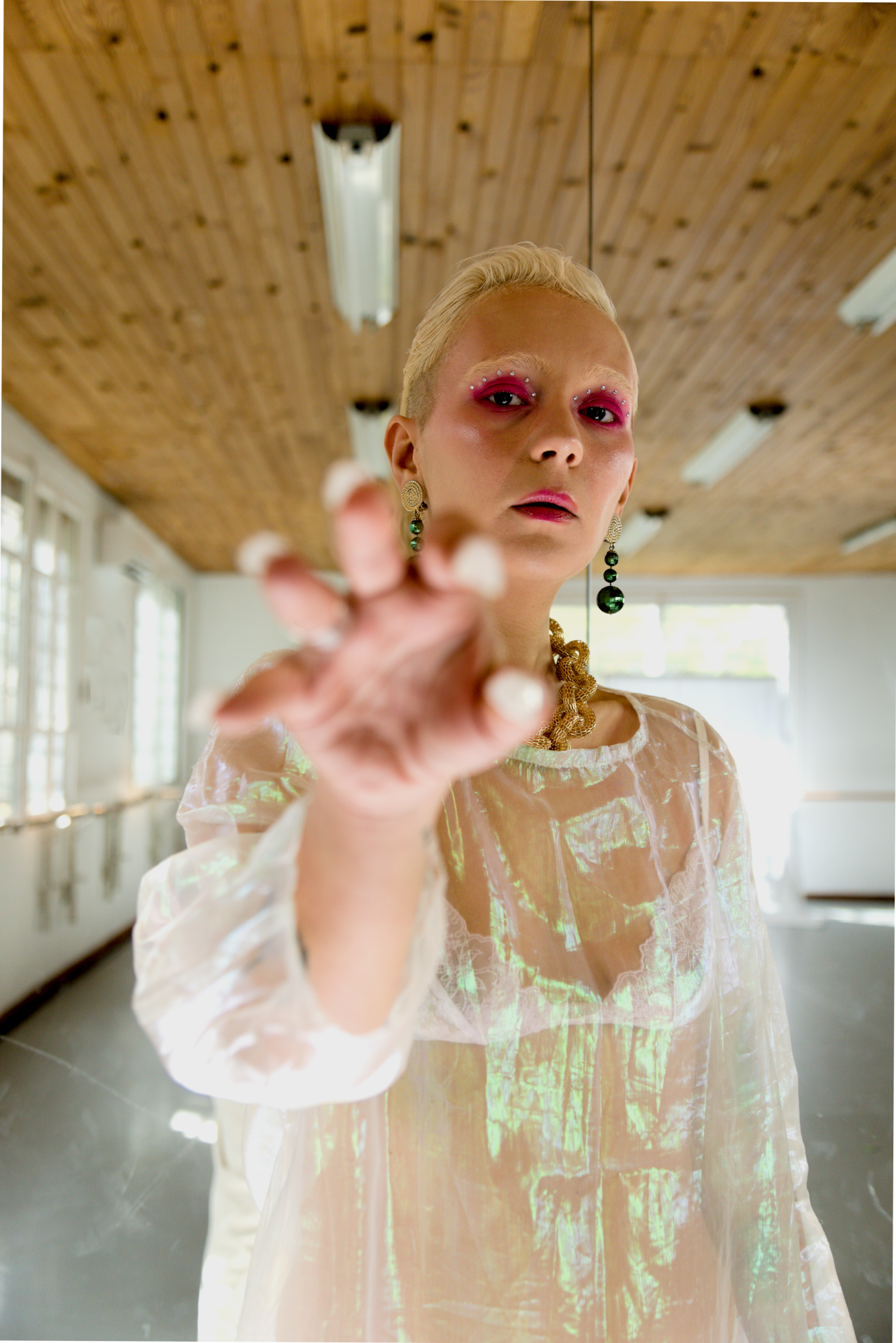Louise Campion Challenges Corporate Power Dynamics With Her Colourful Paintings
Painting by Louise Campion
We’re all for artists who challenge the patriarchal structures of the corporate world, and Louise Campion is doing just that. She’s a Montreal-based French painter, who’s series "Wondering if men in suits turn me on or piss me off" really struck a chord.
If you’re frustrated with your 9-5, and love bright, bold, colours, you’ll love Louise’s work. We got to chat over email about the series, allyship, and more.
Painting by Louise Campion
Malaika Astorga for Also Cool: When did you get into painting? Has your creative practice always been centred in painting, or has it evolved over time?
Louise Campion: I started painting classes at six years old. Around 15, I got more and more into art history and contemporary art. Eventually, I started learning about conceptual art and would choose my mediums depending on the idea I wanted to focus on. But as stimulating as this journey was, I came to realize that I am, first and foremost, a painter. Centring my practice around painting is the most natural way for me to research and create. I am still open to other mediums, but I just know that painting makes the most sense when it comes to my own sensibility.
Also Cool: I love any art form that plays with the absurdity of office culture. What do you think you've learned about yourself by existing in relation to these men in suits and also through making paintings about them?
Louise: To clarify, I am not currently working in an office environment. My dad has worked in an office all of his life and growing up, I was surrounded by a lot of people who did or were aspiring to. I found ways to avoid office jobs, except for that one summer, which was very alienating for me. My observations of the corporate world are made through personal experience, discussions, readings, and research. I keep learning and adjusting my views every day.
I am trying to create an environment for myself that is as free as possible from the corporate mindset, which is, consciously or not, based on an oppressive system. However, I do think we always exist in relation to these "men in suits," whether we admit it or not. In a capitalist society, anything you do or buy would have been in some way regulated by someone behind a desk taking decisions based on a profit. The very mere fact that this is the social structure we've been raised in makes it very difficult to completely detached oneself from it. My sense of safety, comfort, pleasure were programmed to find themselves in the idea that money is central.
Thus, my answer is that I am on a journey to deconstruct these presets, but it takes time and as important as it is, it is not very comfortable.
Painting by Louise Campion
AC: You often speak of how success and hard work only matter if they are free of oppression and yet are fascinated with white male office culture. Can you break down some of the ways that someone in an office environment can fight against the barriers of oppression that often exist in these spaces?
LC: This is the million-dollar question, right?!
When I talk about contemporary western oppression, I refer to the different systemic issues standing in the way of climate and social justice. It includes white supremacy, patriarchy, classism, heteronormativity, ecocide & pollution, among others… Obviously, most of those issues are deeply engraved in our system. They're tough to counter since they are extremely beneficial to the 1% who are economically governing us right now. How do you stand in the way of the wealthiest people on the planet when said planet functions under capitalism? All the more when you happen to work for these people?
Realize that it is a lot of work: Current systems are profiting from current oppression and won't show you how to fight it. They actually make it very easy to ignore it, even as an oppressed person. You have to go out of your way to teach yourself and make changes happen. I know you and your colleagues are comfortable right now, but others aren't, and you can help with that. This will be a never-ending journey. We're in it for the long run.
Educate yourself to educate others: Through the infinity of resources available out there for free! Books, videos, podcasts, articles, illustrations, graphics, Instagram accounts, TV shows, blogs… Whatever speaks best to your learning mechanisms: it is already there; just look for it and share the knowledge!
Get trained: Attend anti-oppression training. Organize one in your workplace. Professionals will give you and your coworkers concrete tools to implement in your work environment. Ideas to discuss. Changes to make. In Montreal, I know that CoCO (the Centre for Community Organization) offers various workshops on anti-oppression and conflict resolution, and they're very good. I am sure you can find other similar resources.
Implement anti-oppression policies: Make it mandatory to be inclusive. Make it punishable to be oppressive. On the professional level. (CoCO can help to write the policies).
Pay attention to who you give your money, time and energy to (which are all the same things under capitalism): Who do you work for? What do you buy? Where do you spend your weekends? What do you watch on YouTube and Netflix? Where do you get your nails done? Who do you play basketball with? Where do you volunteer?
The corporations that are oppressing people and killing the planet gain their power from money. Money that you can decide not to automatically give them, as a first step towards not condoning oppression. In many instances, your money could go to people and things that are undermined by the current system, hence encouraging a more ethical, kinder economy. Slowly but surely, start paying attention to things like who you buy from, what it's made of, who the money is going to, and more.
Although there is no such thing as ethical consumption under capitalism, there are multiple ways to get closer. Do some research. Make it exciting. Love spending the money you gave your time and energy for in the right places.
Learn to differentiate performative allyship from genuine effort: Whatever you do, make sure you're actually helping and not just making yourself feel better. Check yourself. Google things instead of taking an underprivileged person's time to answer your questions. See if you can help an initiative that is already there, instead of creating your own. Question your reflexes because they're based on entitlements and privileges, and it takes time to deconstruct them.
Vote for someone who cares: This one seems a bit obvious, but voting for people (at any scale) who will work towards fighting for those issues might be an idea to consider, haha.
It doesn't have to be perfect, and it doesn't have to be all at once: I once read that it takes around three months for a new habit to become automatic to the human brain. I have started tackling my "bad" habits half a decade ago. I didn't change everything in one day. I implemented a small change, and when it became normal to me, I started tackling another. Five years later, my lifestyle has drastically changed, and I'm excited about improving more and seeing where I'm at in another five years. Improving gradually is better than changing everything and then giving up. One small change is better than none.
Last but not least, you're gonna fuck up: As established earlier, this is a long learning process, and we're all making mistakes. There is so much material to integrate into the journey of inclusivity: Don't give up. When you fuck up, don't beat yourself up forever. Don't apologize endlessly. Just learn your lesson, research a bit more, and move on.
Painting by Louise Campion
AC: How do you balance your practice IRL with your online presence? Does social media affect your creative practice at all?
LC: I am still figuring it out, evolving, adjusting the way I present myself online, as well as the way I use the platform to learn about my peers and field.
On one side, social media (especially Instagram) shows me a lot of art, news from galleries, museums, collectives, artists I follow, critics etc. It keeps me on track with what's happening in the art world and gives me clues on where to look for more. It also allows me to display my practice easily, to reach an audience from my own bed! So it's a very useful tool. Sometimes this idea that I need to stay active online to show that I am productive and professional to my "following" forces me to go to the studio and paint on days that I had trouble finding the motivation.
On the other hand, it can be overwhelming and anxiety-provoking. Seeing what everyone is doing (/only seeing their success) can be very tough because I tend to compare myself a lot. But when I mainly produce from home and rarely have IRL contact with my art community, it's easy to fall into a vicious circle of insecurity towards my own practice.
Ultimately, I am getting better at finding the balance. I have started to see Instagram only as an optional tool that I can use, or not, depending on my energy level and needs. My mindset is now to see others' successes as inspiration instead of paralyzing competition. I've stopped following accounts that bring me down. If it makes me nervous instead of motivated, I'll unfollow or hide their content. It's nothing personal. Art memes pages also help a lot in keeping things real, bring a lot of fun and comfort to the artistic Instagram experience.
Painting by Louise Campion
AC: This is the mandatory quarantine question, but I am actually really interested in how your creative practice has been affected throughout the pandemic.
LC: The beginning of quarantine last year was very beneficial to me. Fall 2019 was right after my graduation. When you've spent the first 20 years of your life in school, it is quite an adjustment to find purpose without academic demands. March to June 2020 gave me space, lowered the pressure. Everyone was stuck at home, so suddenly, it was okay if I was too. I was so lucky I had a studio at home, a close friend as a roommate and an adorable cat. I rested, cleaned, thought about a lot of things, and started producing and applying to things again.
After last summer, my mental and physical health started deteriorating. Lots of projects got cancelled or postponed again. Lockdown got stricter. All of this free time stuck at home became somehow exhausting. Yes, I was still lucky, but expectations were back. I am expected to produce because I am an artist and have nothing else to do, right? But my bubble is so small. I don't see anyone, I don't talk to anyone, galleries were closed again, curfew happened. I miss human contact, miss the energy of a crowd, miss my family, my friends from home, and miss Montreal even though I haven't left it in a year.
It all comes in waves; I see this whole situation as an ocean. Sometimes I feel like I am drowning, but other times I keep myself afloat. Museums reopening was truly the highlight of my winter. I am not as productive as I'd like to be, but still, we are in a global pandemic, so I try to be kind to myself. I always have projects ongoing. Nowadays, I am trying to achieve at least three "productive" things a day so I don't get stuck in a depressive episode but don't overwhelm myself with pressure.
What I'm saying is that it varies a lot, and I'm just trying to keep swimming, haha.
AC: Switching gears, who are some people or artists who have inspired you this year?
LC: My art partner, ex-quarantine mate, and very close friend Tatianna has been huge support this year in various ways. She is a great artist who inspires me daily. My friends Joyce, Akira, and Francois are also strong sources of growth, purpose or just by being themselves. They constantly challenge my views and keep me in check. Chloë and Nina have been important parts of my Montreal support system through COVID. I'm thinking about my friends Chris and Devon, who have been going through challenging situations this past year and are still fighting to become the best version of themselves.
Otherwise, Inès Longevial and Chloe Wise are two women figurative painters I look up to a lot and am inspired by.
Louise in her studio
AC: What are you looking forward to developing with your art this year?
LC: I am excited to change the scale in my paintings. I'll make a bunch of smaller ones and lower the figures' scale simultaneously, which is a challenge to me. I would like to start using more white and skin tones colours in my compositions, but we'll see how I feel when it's actually time to choose the pigments!
I also want to draw more. I am excited about this series finally growing because I started it knowing it would gain its power through numbers.
AC: Finally, do you have any upcoming projects we can look forward to? If not, is there anything/anyone you want to shout out?
LC: I've been selected for a solo show at the CCGV for the 2021/2022 programming, so I'm looking forward to that. We still don't know about the exact dates since it depends a lot on how the government measures will evolve but keep your eyes on my socials, and I'll let you know as soon as possible!
Louise Campion
Malaika Astorga is the co-founder of Also Cool. She is a Mexican-Canadian visual artist, writer, and social media specialist, currently based in Montreal.


